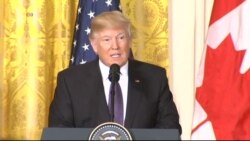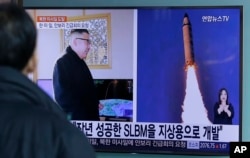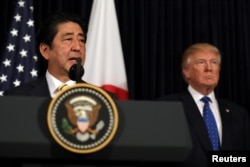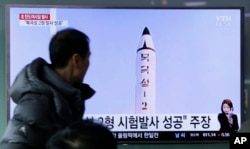U.S. President Donald Trump called North Korea a "big, big problem" following the communist nation's latest ballistic missile launch.
During a news conference Monday at the White House with Canadian Prime Minister Justin Trudeau, Trump said his administration will deal with North Korea "very strongly." He did not give further details.
Trump also praised his weekend meetings with Japanese Prime Minister Shinzo Abe in Florida. The two leaders were together Sunday when they learned North Korea launched its latest missile, which South Korean military officials said traveled about 500 kilometers before landing in the Sea of Japan.
Abe called North Korea's actions "absolutely intolerable."
WATCH: Trump discusses North Korea missile test
International community reacts
The U.N. Security Council met in an emergency closed-door session to discuss the launch late Monday. The United States, Japan and South Korea requested the meeting.
In a statement, the 15-member council condemned Sunday's launch as a "grave violation" of Pyongyang's international obligations under six U.N. resolutions.
"The members of the Security Council deplore all the Democratic People's Republic of Korea ballistic missile activities, including these launches, noting that such activities contribute to the Democratic People's Republic of Korea's development of nuclear weapons delivery systems and increase tension," the statement said.
The council added that it will "continue to closely monitor the situation and take further significant measures." It did not elaborate on what those measures would be.
In the past, most recently in November, the council tightened existing international sanctions and imposed new ones targeting the sectors that generate cash to fund the nuclear and ballistic missile programs.
"We call on all members of the Security Council to use every available resource to make it clear to the North Korean regime — and its enablers — that these launches are unacceptable," U.S. Ambassador to the United Nations Nikki Haley said in a statement. "It is time to hold North Korea accountable — not with our words, but with our actions."
Japan's U.N. envoy, Koro Bessho, whose country was in the line of fire of Sunday's test launch, told reporters that the council was "very unanimous" in saying there must be implementation of the resolution adopted in November. "That's a starting point," he said, adding that the council will keep watching the situation closely.
U.N. Secretary-General Antonio Guterres also condemned the missile test as a "further troubling violation" of U.N. resolutions.
Guterres said Pyongyang "must return to full compliance with its international obligations and to the path of denuclearization," and he urged the international community to continue addressing the situation in "a united manner."
Tom Karako, with the Washington-based policy research group, Center for Strategic and International Studies, told VOA the missile launch is a test for the new Trump administration. "Every administration is tested early in its tenure. This may be one of the early tests but it won't be the last."
'Great satisfaction'
In North Korea, the state-run KCNA news agency said the test was a "Korean-style new type strategic weapon system," and boasted it was overseen by leader Kim Jong Un.
It said Kim "expressed great satisfaction over the possession of another powerful nuclear attack means, which adds to the tremendous might of the country."
Chinese Foreign Ministry spokesman Geng Shuang on Monday said China opposed the launch, which violated U.N. Security Council resolutions. He added that China, one of the five permanent Security Council members, urges all sides to refrain from any provocative acts and believes dialogue is the path to a resolution.
Russia's Foreign Ministry also expressed concern Monday about the missile launch.
Test taken as challenge
The North Korean test was widely interpreted as a challenge to the Trump administration.
NATO Secretary-General Jens Stoltenberg also condemned the launch, calling it a further violation by Pyongyang of multiple U.N. Security Council resolutions.
North Korea conducted two unauthorized nuclear test explosions last year and launched nearly two dozen rockets in continuing efforts to expand its nuclear weapons and missile programs. Kim declared in a speech on New Year's Day that his country has "reached the final stage" in its program to build ICBMs [Inter-Continental Ballistic Missiles], but Western experts have been skeptical about his forecast.
North Korea plays it safe
Harry Kazianis, the director of Defense Studies at the Center for the National Interest in Washington, said North Korea wanted to provoke Trump with Sunday's missile launch, but did not want to risk an ICBM test that might fail.
"I think the North Koreans would be a little bit afraid that if [an ICBM] test failed that would obviously not make them look very good," he said.
VOA’s Libo Liu and Margaret Besheer contributed to this report.










